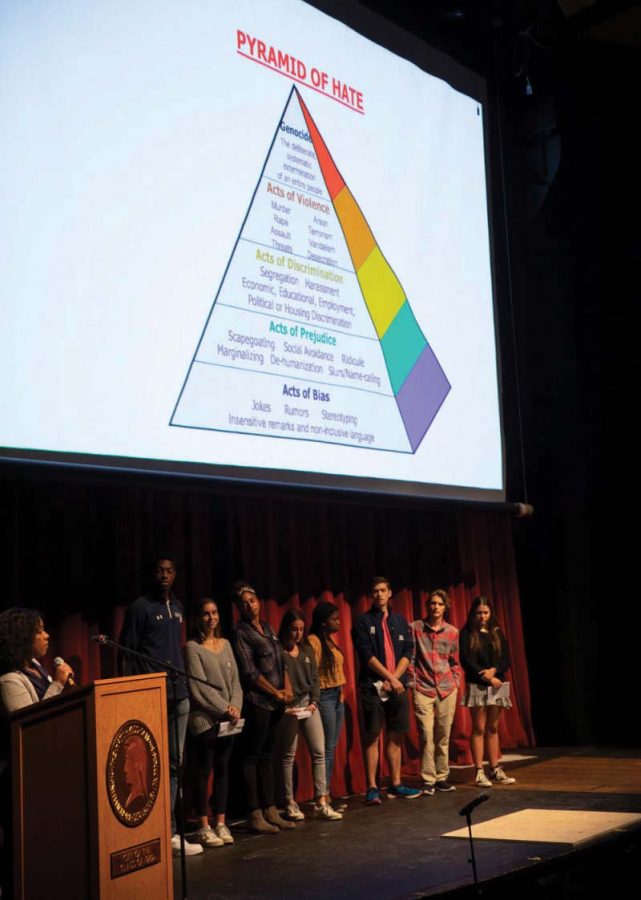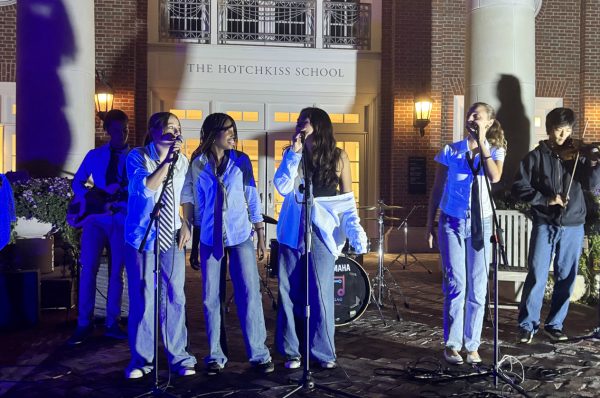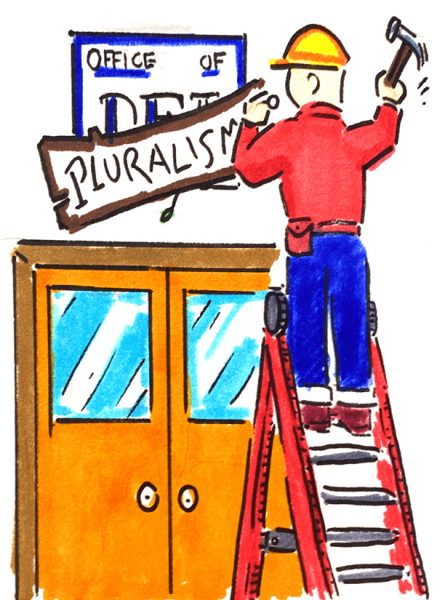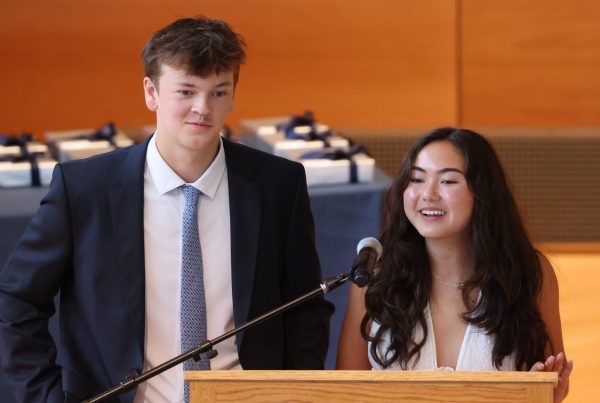Hateful Speech at UConn
Student facilitators present the Pyramid of Hate at the ADL Programming on Friday, October 25.
Both Hotchkiss and the University of Connecticut (UConn) have looked for ways to address recent incidents of hate and bias. Following student protests last month, two students at UConn were arrested for hate speech.
On Friday, October 11, two white male students were recorded saying the N-word while walking around the UConn campus. Ten days after the incident, the students were arrested and charged with ridiculing people “on account of creed, religion, color, denomination, nationality, or race.” If convicted, they face up to 30 days in jail and a fine of up to $50. They appeared at Rockville Superior court on Wednesday, October 30.
The UConn police department conducted an investigation and found the accused students had been drinking and were playing a game in which they shouted racial slurs. According to The New York Times, Mr. Jarred Karal, one of the offenders, said “It was not our intent to broadcast what was said to any one person; we were just being immature.”
A week after the incident, Thomas Katsouleas, President of UConn, sent a letter to community members addressing the event. In it, he condemned the students behavior and discussed his administration’s ongoing search for a Chief Diversity Officer.
Many students and faculty believe Mr. Katsouleas should have addressed the incident immediately. Dr. Noel A. Cazenave, professor of sociology, wrote to Mr. Katsouleas, “By your painfully slow response – following more than a week of silence – you have unwittingly condoned campus racism in ways that makes people of color here at the University of Connecticut feel both unwanted and unsafe.”
While some members of the UConn community agree that the students’ speech should be criminalized, the American Civil Liberties Union (ACLU) disagrees. In a statement released on the 23 of October, the ACLU states that, although the racial slurs were offensive, they are protected by the guarantee to free speech made by the First Amendment. David Cole, national legal director of the national ACLU wrote, “Although the conduct reported in this incident is reprehensible, it is not criminal. Nothing in the press reports indicates that the students’ speech, while morally abhorrent, meets that demanding standard. The ACLU has long supported robust constitutional protections for speech, including speech we vehemently oppose.”
Recently, Hotchkiss has been proactive in addressing acts of hate and bias and taking measures to prevent them. On Friday, October 25, students attended a Wellness Day program led by the Anti-Defamation League (ADL) entitled “The Truth About Hate.” The progam was allowed students to share their experiences and learn to combat acts of hate and bias. The Anti-Defamation League’s website says, “This program is designed to help school communities understand how [hate and bias] affect their daily lives and the role [participants] can play in challenging prejudice and hate.”
Last spring, Dr. Rachel Myers, director of diversity and inclusion, began Community Conversations, an initiative to educate community members on how to prevent hate speech. Dr. Myers said, “Hate is learned. If the school culture is one where hatred can thrive without being prevented or stopped, then that’s bad news for all of us. I think [“The Truth About Hate”] in particular brought a lot of things to light.”
The Wellness Day began with a short presentation by student facilitators and a video about three white supremacist teenagers learning about the impact of hate. An open microphone session followed, in which students were able to share stories about their experiences with hate and bias at the school.
After Auditorium, the school broke up into small groups to talk about the presentation and how we can intervene to reject hate and bias. Benjamin Weiss ’21, one of the student facilitators of the program said, “My goal [in being a student facilitator] was to make an impact on the community…and give back. I think it is important that we can look at the values Hotchkiss stands for…and how, even though the school is amazing, we are not perfect.”
Dr. Myers will continue to facilitate monthly Community Conversations throughout the year, addressing topics related to identity, such as race or religion. There will be a Community Conversation addressing the topic of religion on Tuesday, November 12, from 6:45-7:45 p.m.





